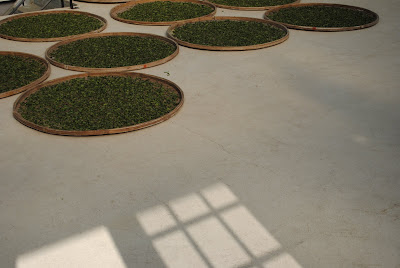I'm up before 5am, and there's plenty of birds to keep me company. It stays light so late I lose all track of time (although that phenomenon does seem to span multiple seasons). All this means more hours in which to drink tea—I do drink it after dark, but usually only an oolong that I've been nursing all day and I can't bear to part with, or a pu-erh that's older and wiser than I am.
The other morning I was lucky enough to have a bit of a gorgeous Phoenix Song Dynasty to start the day. It's a carefully twisted, semi-oxidized oolong from China that seems to reveal more of its green-ness with each steeping. Woody, lightly sweet and intensely fragrant, this is a tea you can get lost in before you even realize what's happened.
But after five cups, I had to break down and have something to eat. I wanted something as floral and lingering as the tea, and this strawberry ginger jam was the answer.
It's something I make every late spring, as soon as those little plump rubies appear in the farmer's market. They're around for just a few short weeks and it's hard to not just eat them out of hand, but this jam helps extend the season a little longer.
Strawberry Ginger Jam
Makes: about 1 1/2 cups
 1 small lemon, peel and pith removed, flesh coarsely chopped
1 small lemon, peel and pith removed, flesh coarsely chopped
5 cups strawberries, hulled, halved if large
1/3 cup sugar
1 teaspoon freshly grated ginger
1/4 teaspoon black pepper
Place all ingredients in a medium saucepan; heat to boiling then lower to a gentle simmer. Cook, stirring occasionally, about 30 minutes or until thick.
Makes: about 1 1/2 cups
 1 small lemon, peel and pith removed, flesh coarsely chopped
1 small lemon, peel and pith removed, flesh coarsely chopped5 cups strawberries, hulled, halved if large
1/3 cup sugar
1 teaspoon freshly grated ginger
1/4 teaspoon black pepper
Place all ingredients in a medium saucepan; heat to boiling then lower to a gentle simmer. Cook, stirring occasionally, about 30 minutes or until thick.
This is lovely slathered on olive oil cake for breakfast, or just eaten on a spoon—whatever lets you get back to the tea more quickly.






























